Iranians In Sweden Call For Closure Of Mosque As ‘Espionage Center’

Iranian protesters held a rally outside the Imam Ali Mosque north of Stockholm, demanding the closure of the center, calling it "Islamic Republic's espionage nest."

Iranian protesters held a rally outside the Imam Ali Mosque north of Stockholm, demanding the closure of the center, calling it "Islamic Republic's espionage nest."
The protesters paid homage to the victims killed by the Islamic Republic, lighting candles, and placing flowers next to their photos.
About two million of Sweden's population is made up of immigrants with different religions, and the government provides financial assistance to their religious centers, including the Imam Ali Mosque in Stockholm, affiliated to the Islamic Republic.
However, Iranians living in Sweden, human rights and political activists believe Imam Ali Mosque is not a place of worship, but a "nest of espionage for the Islamic Republic".
In the past year, Swedish media published numerous reports about Imam Ali and other mosques, including in Malmö, saying that temporary marriages are practiced in these mosques, calling it "legal prostitution".
Some Swedish parliamentarians have also called for the closure of such places because, according to them, these mosques, specifically the Imam Ali Mosque, receive funding from non-democratic governments such as the Islamic Republic of Iran.
In the past weeks, Iranians also gathered in front of the Islamic Center in Frankfurt and Hamburg, calling them dens of Islamic Republic espionage and demanding their closure.
In the meantime, Iranians living in Melbourne, Sydney, Adelaide, Brisbane, Hamburg, Cologne, Berlin, Copenhagen, Auckland, etc., held gatherings on Saturday to express support for the Iranian people's uprising against the Islamic Republic.
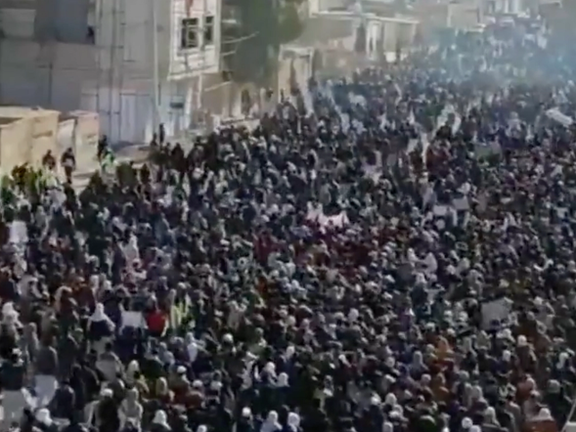
Following a large protest rally in Iran’s southeastern city Zahedan on Friday, security and intelligence agents launched a new wave of arrests aimed at young people.
Thousands of Baluch citizens took to the streets in Zahedan Friday for the 16th consecutive week and chanted “Down with the Dictator” and “Khamenei is a murderer; his rule is illegitimate”.
The Sunni Baluch population have held protests in Zahedan every Friday after prayers since September 30 when government forces cracked down on demonstrators, killing more than 80 people.
Reports say a new round of detaining Baluch teenagers and youths is underway since Friday, and according to Hal Vash website, which monitors events in Sistan-Baluchestan province and those affecting Iran's Sunni minority, police forces arrested several young Baluch men in different neighborhoods of the city.
While Iran’s Judiciary claimed earlier this week that thousands of protesters have been freed, it arrests more people, and those released face legal charges that can send them back to prison.
"The families of the detained citizens have held gatherings in front of the police station demanding the release of their children," added Hal Vash.
Based on the report, security forces have arrested several Afghan and Uzbek nationals living in Zahedan, threatening residents not to do business with these Sunni people.
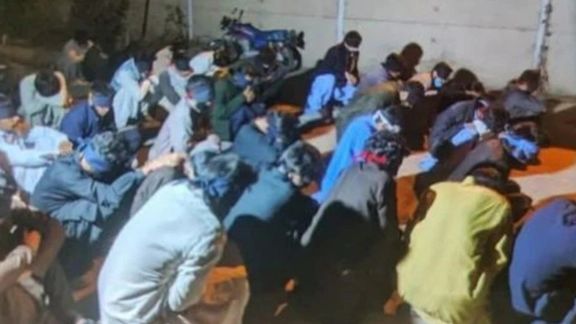
On the other hand, regime forces and plainclothes agents arrested Baluch people who did not have identity documents or were not carrying it.
The pressure on Baluch citizens has began since Wednesday with setting up checkpoints at several roads leading to Zahedan.
Mowlavi Abdolhamid, the outspoken Sunni leader of Zahedan delivered yet another fiery sermon Friday protesting the doubling of checkpoints. “Seven stop and search checkpoints have turned into fifteen,” he said.
Abdolhamid has become an effective critic of the Islamic Republic since September, speaking freely even against Supreme Leader Ali Khamenei. Although the regime could arrest him anytime, that would lead to further trouble with Sunnis, and especially the Baluch population who regard them as a community leader and an advocate of their grievances.
The new measures included at least fifteen concrete block stop and search checkpoints on roads leading to Zahedan to control the flow of cars into the city, with security forces demanding identification and often questioning passengers. Internet connection has also been heavily restricted in the province since protests began four months ago.
“A government that does not listen to the voice of the people does not deserve to rule,” said Mowlavi Abdolhamid in his Friday sermon in Zahedan, capital of the restive Sistan-Baluchestan Province.
In recent weeks, the Islamic Republic has threatened and arrested dozens of citizens in Sistan and Baluchestan and beefed-up security in Zahedan with the aim of ending the routine protests on Fridays.
The detainees were mostly teenagers and young people, and according to Baluch activists, many of them are under pressure to "give forced confessions".
Since the beginning of protests in Zahedan and other cities of the province, many citizens have been detained with the fate of many remaining unknown.
According to Hal Vash, the regime has sent private messages to Mowlavi Abdolhamid through influential tribal figures, threatening to arrest him and destroy Makki Mosque in which he delivers sermons.
The increase of threats, along with mass arrest of Baluch youths, has raised concerns about the possibility of another brutal attack by the regime on Zahedan protesters.
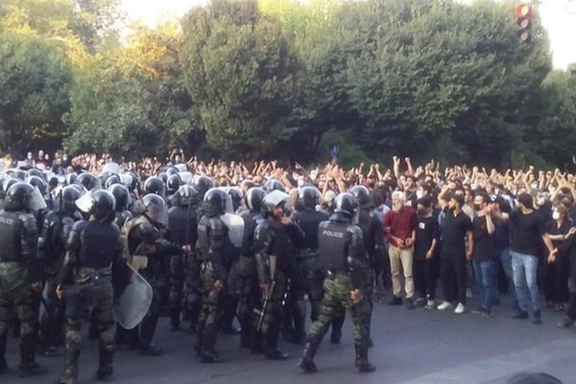
Jalil Rahimi Jahanabadi, a lawmaker from northeast Iran, has said that “our policies anger the young generation,” and our economy has a mafia-like structure.
Jahanabadi further charged that Iranian officials do not believe in governance as an expertise and try to “re-invent the wheel” instead of learning from 200 other countries.
"Iranian politicians are constantly reinventing the wheel. They never ask themselves how their counterparts in 200 other countries treat and manage their national currencies and foreign exchanges. They do not believe in banking as a knowledge-based practice and an expertise. With all that I wonder why we are so complacent and always believe that we can correct the world," the lawmaker said.
He drew attention to the fact that officials during the past weeks claimed that the fall in the value of Iran’s currency was the outcome of the protests. But they never ask themselves why it keeps falling even when the streets are calmer.
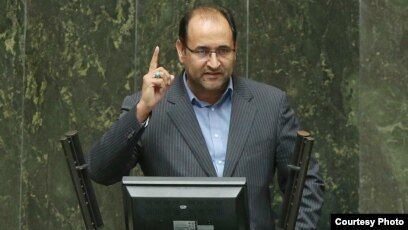
Jahanabadi explained that when society is volatile, some people tend to invest in real estate in other countries. This has happened during the protests in 2017-2019. In 2022, a lot of capital left Iran for purchasing properties in Armenia, Georgia, Turkey and the United Arab Emirates.
Furthermore, at times of unrest, many shift their capital to gold and foreign currencies to prevent the devaluation of their assets. Iran’s rial has fallen more sharply and is more vulnerable than even in Iraq and Afghanistan.
Jahanabadi maintained that almost everyone knows that “our political, economic, foreign and cultural policies need reform, but no one knows who should start that reform.” However, he added: "As one of 290 Iranian lawmakers, I think this country needs essential reforms. We need to change the structures, methods, views and policies." He added that as a result of the current situation buying a house, a car and finding a job have been turned into a dream for many young Iranians. Why shouldn't they be depressed and desperate?"
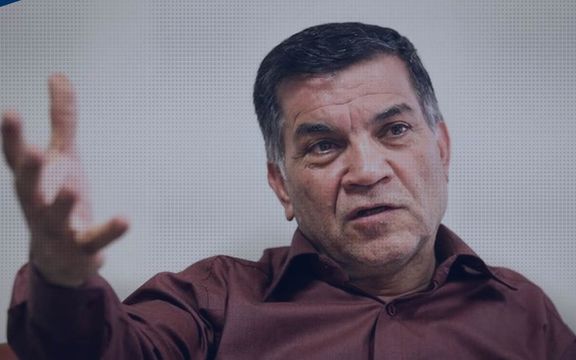
Meanwhile, reformist politician Hassan Rasouli has said in an interview that Iranians' demands are miles apart from views held by officials. Top officials regularly make many false claims. He argued that the political system’s main responsibility is to be responsive to the wishes of the people and this requires comprehensive, long-term and realistic plans.
Rasouli added that the current situation leaves no hope of improvement. Problems in Iran's domestic politics have left no international respect for Iran.
He was probably referring to the government's violent and ruthless reaction to recent protests in Iran and its ignorance of challenges in the international arena. What the officials have been doing in this regard so far, Rasouli said, has been nothing other than simply ignoring or denying problems, while inefficiency is visible in all economic, security, cultural and social matters.
On Thursday, economist Bahman Arman had said that decisions in the government are affected by the influence of a group that is against development and progress. He was probably referring to the intervention of ultraconservative figures, mainly the members of Paydari Party in the affairs of the government, and individuals like former nuclear negotiator Saeed Jalili who offer suggestions to the Raisi Administration on many matters including the nuclear issue without being accountable for the consequences of their intervention.
Like Rasouli, Arman also said that the government does not have an intelligent roadmap and as a result makes too many errors without trying to compensate for them later. As a result, said Rasouli, divides between the people and the government are likely to further widen and Iran's vanishing middle class is likely to be turned into a needy class, although government officials will probably continue to brag about a "progress" that as they claim makes Iran's enemies jealous.
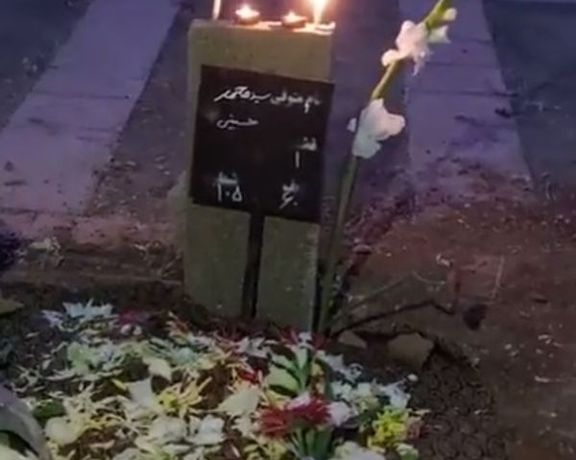
A stonemason who was hired to make a gravestone for executed protester Mohammad Hosseini has been arrested by Iran’s security agents.
The arrest was reported by Kamelia Sajjadian, a mother whose son, Mohammad Hassan Torkaman, was shot dead by the security forces during protests in the northern city of Babol in September.
She said in a tweet on Thursday that her friends informed her the stonemason and his coworkers were arrested for the crime of measuring the grave to make a tombstone, adding that “I have never seen such brutality anywhere in the world.”
“A government that considers itself a regional power is afraid of the stone on a dead person's grave,” she noted.
The 39-year-old Hosseini – with no apparent family members -- was one of the loneliest victims of the regime’s crackdown, and his hanging drew massive reactions on social media where Iranians can speak freely. Grieving over his execution, people regularly gather at his grave and shower it with flowers and distribute food and sweets in the honor of their new hero, as is customary by bereaved families in Iran.
The regime hanged Hosseini along with Mohammad Mahdi Karami for allegedly killing a member of the security forces during protests that were triggered following the death of 22-year-old Kurdish woman Mahsa Amini in police custody in September. The convictions were not based on a criminal charge related to the murder per se, but they were charged with ‘moharebeh’, meaning “war against God”, a vague religious concept.
In the past few weeks, the Islamic Republic prevented the installation of a stone on the grave of Mohsen Shekhari, the first protester that the regime executed. Later, they broke the tombstone that was installed stealthily.
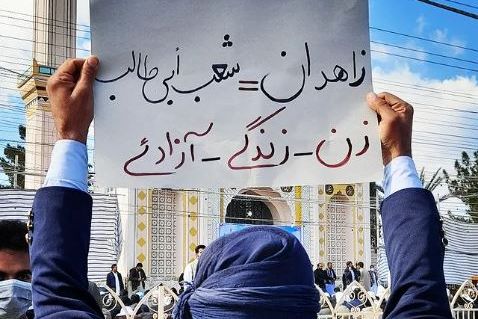
Mowlavi Abdolhamid delivered yet another fiery sermon in southeastern Zahedan Friday while another Sunni imam, Mowlavi Gorgij, was put under house arrest in northern Iran.
“A government that does not listen to the voice of the people does not deserve to rule,” said Mowlavi Abdolhamid in his Friday sermon in Zahedan, capital of the restive Sistan-Baluchestan Province.
Thousands of Abdolhamid’s congregation took to the streets in Zahedan for the 16th consecutive week after his sermon and chanted “Down with the Dictator” and “Khamenei is a murderer, his rule is illegitimate”.
The Sunni Baluch population have taken to the streets in Zahedan every Friday after prayers since September 30 when government forces cracked down on protesters and killed more than 80 protesters.
Similar protests were held Friday in Rask, another city in Sistan-Baluchestan, in support of Abdolhamid and Mowlavi Abdul Ghaffar Naghshbandi, another Sunni Baluch cleric. In the past four months Naghshbandi has been under pressure from the authorities for confirming that allegations of a police chief raping a fifteen-year-old Baluch girlwere not true.
A Revolutionary Guard commander, Brigadier General Mohammad Karami, was appointed as provincial governor three weeks ago. Security measures and restrictions in the province and particularly its capital Zahedan have escalated to an unprecedented level.
In his sermon this week, Abdolhamid also protested to the doubling of checkpoints in Zahedan. “Seven stop and search checkpoints have turned into fifteen,” he said.
The new measures include at least fifteenconcrete block stop and search checkpoints on roads leading to Zahedan to control the flow of cars into the city, with security forces demanding identification and often questioning passengers. Internet connection has also been heavily restricted in the province since protests began four months ago.
Abdolhamid also argued that the government’s unjustified security-driven attitude to Sistan and Baluchestan impedes development as it discourages investment and progress. “People will establish security themselves [if allowed],” he said.
By “security-driven attitude” Abdolhamid apparently meant the government’s and the Shia establishment’s general lack of trust in Sunni communities across the country. Some officials and Shiite clerics who see Iran's Sunni minority as a threat to the Shia establishment occasionally raise alarm over the growth of the Sunni population in Iran.
Over 1,300 kilometers north of Zahedan, in the northern Golestan Province where there are large Sunni Baluch communities living for decades, another Mowlavi (Imam), Mohammad-Hossein Gorgij, has reportedly been put under house arrest in Galikesh.
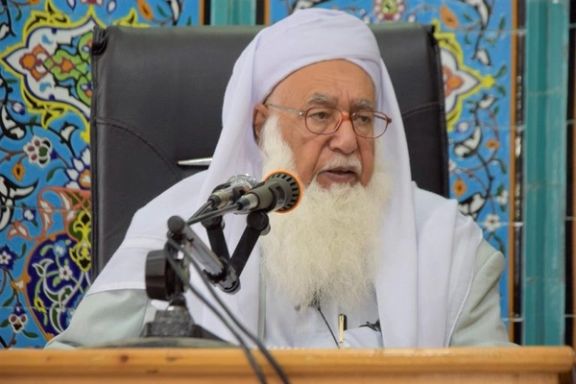
Gorgij who served as the Sunni imam of Azad Shahr, 35 kilometers from Galikosh, was dismissed as Friday Imam of the Sunni community of Azad Shahr in Golestan in December 2021 by Supreme Leader Ali Khamenei’s representative in the province for protesting to Shiites slandering Sunni caliphs.
Khamenei’s provincial representatives have the power to appoint and sack not only Shiite but also Sunni imams.
“Authorities have told me that my participation in Friday prayers is not befitting. My presence at Friday prayers is people’s wish not my own,” Gorgij told his supporters who had rallied outside his home in Galikosh Friday. “A government that is not on people’s side is not worthy of ruling,” he said.
Sistan and Baluchestan is Iran's largest but least developed province where around two-thirds of the population live in extreme poverty. The northern part of the province, Sistan, is predominantly Shiite while the southern part, Baluchestan, is Sunni majority.
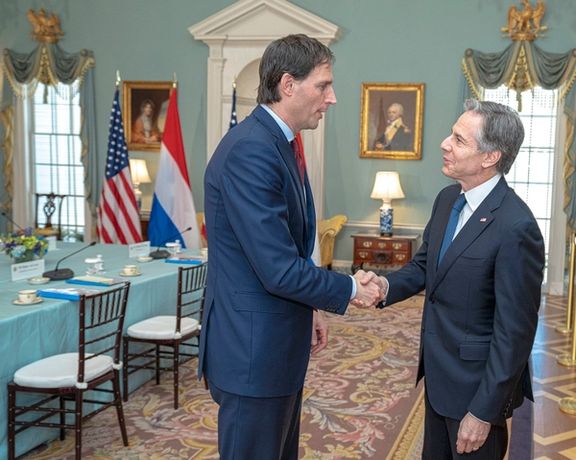
As the European Council is set to decide about European Parliament’s call to list Iran’s Revolutionary Guard as a terror group, the Netherlands has already expressed its support.
Dutch Foreign Minister Wopke Hoekstra said in a tweet on Thursday that “The Netherlands is strongly in favour of listing the IRGC as an entity, a step that requires the joint commitment of EU member states.”
He added that he held talks with High Representative of the EU for Foreign Affairs and Security Policy Josep Borrell about Russia and Iran.
“We also addressed the grave human rights violations in Iran,” he said, noting that “We need to continue to sanction those responsible.”
Hoekstra also said he will also hold talks with German Foreign Minister Annalena Baerbock to address this issue at the upcoming EU Foreign Affairs Council.
The Dutch foreign minister also held talks with US Special Envoy for Iran Robert Malley. “Productive meeting with Foreign Minister Hoekstra. We discussed our common steps to confront Iran's human rights abuses and counter its provision of weapons to Russia for use in its brutal war of aggression against Ukraine,” Malley said.
Although the European Parliament overwhelmingly passed the non-binding resolution on January 19, it cannot decide to designate the IRGC, which is an issue within the purview of the EU Council, comprised of ministers of each EU country. If the resolution garners enough support, it is then upon the national governments of the EU member states to make the final decision. The listing of the IRGC must have a unanimous vote by all 27 EU members in the EU Council.